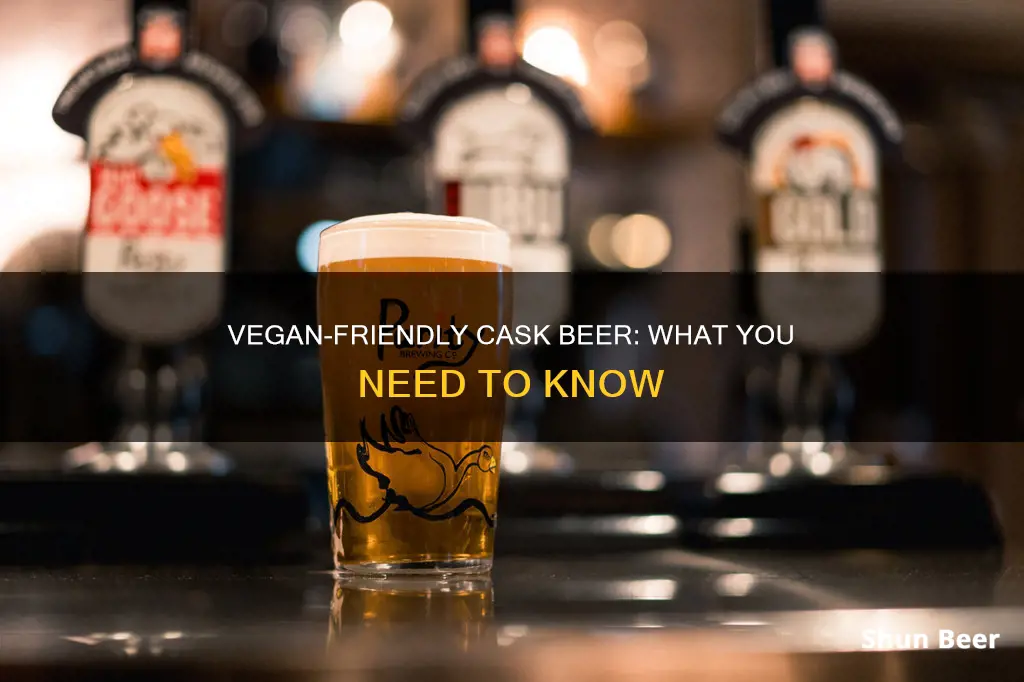
Vegans can drink beer, but not all beers are vegan. While the core ingredients of beer—water, yeast, hops, and grain—are vegan-friendly, some brewers add non-vegan ingredients during the fining or filtration process. These clarifying agents, such as isinglass, gelatin, and casein, are derived from animal products. Isinglass, for example, is made from the dried swim bladders of fish. Cask ales, or real ales, are a traditional British brew that often uses isinglass as a fining agent, so vegans may want to avoid them. However, there are vegan alternatives to isinglass, such as carrageenan derived from Irish moss and pea protein.
| Characteristics | Values |
|---|---|
| Basic ingredients | Yeast, water, hops, grain (usually malted barley) |
| Vegan | Yes |
| Non-vegan ingredients | Lactose, isinglass, gelatin, whey, casein, honey, cochineal, carmine, chitin, egg whites |
| Cask ales | Often non-vegan due to use of isinglass |
| Mead | Not vegan due to honey being a core ingredient |
| Milk stouts | Usually non-vegan due to use of whey or lactose |
| Honey beers | Usually non-vegan |
| Vegan finings | Carrageenan, pea protein, Irish moss, seaweed |
| Vegan beers | Budweiser, Bud Light, Coors, Coors Light, Corona Extra, Corona Light, Miller Genuine Draft, Miller High Life, Guinness Draught, Guinness Original XX, Moor Beer Nor'Hop, Badger Fursty Ferret, Bombardier (bottled), Freedom Lager, Red Stripe, Beavertown Neck Oil IPA, Sam Smith Stout, Young's Double Chocolate Stout |
What You'll Learn
- Cask ales are usually made using isinglass, a non-vegan fining agent
- Isinglass is made from the dried swim bladders of fish
- Honey is added to some beers for flavour and sweetness, making them non-vegan
- Lactose, a sugar derived from milk, is added to some beers
- Vegan cask ale can be made using plant-based finings like Irish moss

Cask ales are usually made using isinglass, a non-vegan fining agent
Cask ales, also known as real ales, are a traditional British brew. They are usually made using isinglass, a non-vegan fining agent. Isinglass is derived from the dried swim bladders of fish, including sturgeon, cod, and other tropical fish species. It is a form of gelatin or "fish glue" that has been used since the 19th century to clarify beer and wine. The use of isinglass gives the beer a less cloudy appearance and speeds up the clarification process.
Isinglass is not always listed as an ingredient on beer labels, and breweries often do not disclose the use of animal products in their beers. This makes it challenging for vegans to identify if a cask ale is suitable for their diet. However, some online resources, such as Barnivore.com, provide information on vegan-friendly alcoholic drinks by crowdsourcing information from vegans worldwide.
The good news is that there are vegan alternatives to isinglass, and some breweries are moving away from using it. These breweries are either allowing their beers to be cloudy or finding alternative finings derived from plants, such as Irish moss and seaweed.
It is worth noting that while isinglass is commonly used in cask ales, not all cask ales are made with it. Some brewers choose to use vegan finings or allow the beer to settle naturally without any additional agents. Therefore, it is always a good idea to check with the brewery or look for vegan certifications on the label if you are unsure.
In conclusion, while cask ales are traditionally made using isinglass, a non-vegan fining agent, there are vegan-friendly options available, and the brewing industry is moving towards more transparent and plant-based alternatives.
Beer and Milkshakes: Mixing Drinks, Safe or Not?
You may want to see also

Isinglass is made from the dried swim bladders of fish
Cask beer is often not suitable for vegans. This is because many cask ales use isinglass as a fining agent. Isinglass is a form of collagen obtained from the dried swim bladders of fish. The word 'isinglass' comes from the obsolete Dutch 'huizenblaas' or German 'Hausenblase', which both translate to sturgeon bladder.
The process of extracting isinglass involves removing the bladder from the fish, processing it, and then drying it. The swim bladders are derived from a range of fish, including sturgeon, hake, cod, and ling. In modern British brewing, isinglass is typically made from a blend of material from tropical fish, such as the Nile Perch from Lake Victoria.
Once the swim bladders have been dried, they are formed into various shapes and then macerated and dissolved in dilute food-grade acids. This process creates a turbid, colourless, viscous solution made up largely of collagen, known as isinglass finings. This solution is added to beer to remove yeast and clarify the beverage.
Isinglass has been used for centuries as a fining or clarifying agent in alcoholic beverages. It is added to beer to remove yeast and other particles, resulting in a clear, bright appearance. While most beer is filtered without the need for animal products, British cask ale producers do not filter the beer at the end of the production process. As a result, isinglass is commonly used to fine cask ale, making it unsuitable for vegans and vegetarians.
Recovering Alcoholics and Ginger Beer: Is It Safe?
You may want to see also

Honey is added to some beers for flavour and sweetness, making them non-vegan
Honey is added to some beers for flavour and sweetness, but because it is made by bees for bees, it is not considered vegan.
Honey is a bee's single source of food during the winter months. It provides them with energy and essential nutrients like amino acids, antioxidants, and natural antibiotics. Bees will starve without it.
Honey is added to beer as an adjunct for flavouring and to sweeten the beer. Honey is widely considered a cruelty-free, natural food that does not harm bees. However, animal rights advocates disagree. They argue that honey production involves the exploitation of bees and is therefore not suitable for vegans.
Bees are highly intelligent, sentient beings capable of experiencing a host of sophisticated emotions. Research suggests that bees are self-aware and possess a primitive form of consciousness. They can recognise human faces, process long-term memories while sleeping, and feel emotions such as optimism, playfulness, and fear.
To optimise profits, many commercial bee farmers employ practices deemed unethical by vegan standards. These include frequent queen bee replacement, using protein and carbohydrate supplements to feed the bees, and using antibiotics and synthetic chemicals for pest and pathogen control.
Additionally, to harvest honey, beekeepers either smoke the bees to subdue them, trap them with a clearing board, or kill the colony altogether. Beekeepers then replace the honey with a sugar water substitute, which lacks the nutrients, fats, and vitamins that bees need to be healthy.
Honey is added to some beers for flavour and sweetness, but because it is an animal product, it is not suitable for vegans.
Enjoying Beer at the Beach: Is It Allowed?
You may want to see also

Lactose, a sugar derived from milk, is added to some beers
Lactose, also known as milk sugar, is a sugar derived from milk. It is a disaccharide composed of galactose and glucose and has the molecular formula C12H22O11. Lactose typically makes up around 2-8% of milk by mass. It is produced from whey permeate – whey filtrated for all major proteins.
Lactose is commonly added to some beers, particularly milk stouts, and is thus not suitable for vegans. Lactose is added to beers to build body and mouthfeel, especially in low and non-alcoholic beers, to deliver the same experience as higher alcohol beer. Lactose is also added to some beers to sweeten them, with the resulting beer usually called a milk stout or a cream stout.
Lactose is not always listed as an ingredient on beer labels, so it can be tricky to know whether a beer is vegan-friendly or not. Some resources, such as Barnivore.com, list vegan beers, and some breweries declare that they make vegan beer.
The Process of Canning Beer: A Step-by-Step Guide
You may want to see also

Vegan cask ale can be made using plant-based finings like Irish moss
Cask ale, also known as real ale, is a traditional British brew that is often not vegan. This is because brewers usually add finings to clarify the beer when racking it into a barrel. Finings are clarifying agents that help remove impurities and improve the clarity, flavour, and aroma of the beer. While finings can be plant-derived products like Irish moss, they can also be animal-derived products like isinglass, gelatin, and honey. Isinglass is the most common fining used in cask ale and is made from the dried swim bladders of fish, such as sturgeon and cod.
However, it is possible to make vegan cask ale by using plant-based finings like Irish moss, a type of carrageenan seaweed. Irish moss is added to the boil to help reduce protein haze and create a clear finish. While it is not as effective as isinglass, it is a popular alternative for vegan brewers. Other vegan finings include silicated or vegan finings, which are used after fermentation, and pea protein.
In addition to using plant-based finings, vegan cask ale can also be made by simply leaving the beer longer to drop bright naturally. This natural clarification process occurs if the beer is left undisturbed, and many modern brewers boast of greater flavours and mouthfeel being achieved with their natural hazy and unfined beers.
While it may be difficult to find vegan cask ale, some exceptions to the rule include Bombardier (bottled), Sam Smith Stout, and Young's Double Chocolate Stout.
Beer and Metoprolol: What You Need to Know
You may want to see also
Frequently asked questions
Cask ales, or real ales, are a traditional British brew that often uses isinglass as a fining agent and are therefore not vegan. Isinglass is made from the dried swim bladders of fish. However, some cask ales are now being made with alternative fining agents, such as Irish moss and seaweed, making them suitable for vegans.
Common non-vegan ingredients in beer include lactose, honey, whey, casein, and isinglass. Lactose is often used in stouts and porters to give them a sweet, creamy taste. Whey and casein are the two proteins found in milk. Honey is used in some beers as a sweetener and for flavour. Isinglass is a type of gelatin made from the dried swim bladders of fish and is used to clarify beer.
It can be challenging to determine if a beer is vegan-friendly, as manufacturers are not required to list ingredients on beer labels. However, some beers may be labelled as vegan or have a vegan trademark. Online resources such as Barnivore.com can also help identify vegan beers. Additionally, some breweries, such as Guinness, have confirmed that their beers are vegan-friendly.







